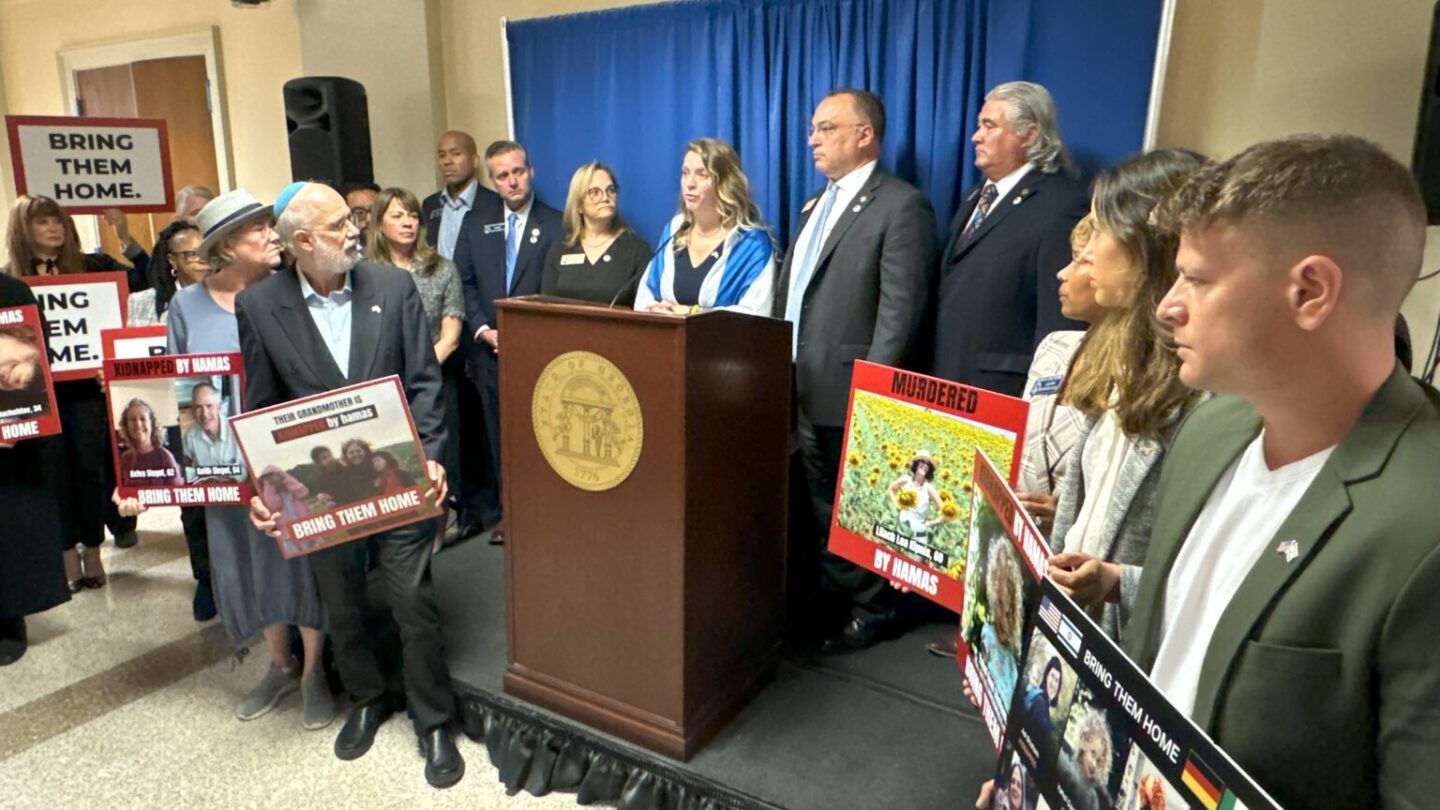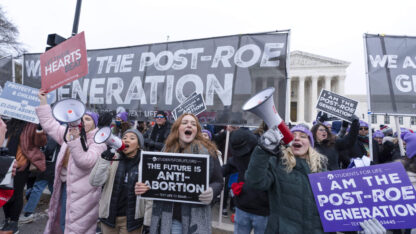Rimon Kirsht didn’t speak or look into the camera during a short video released Monday morning by Hamas showing three Israeli women who are among more than 230 Israeli hostages.
No one in the family had heard from her since the morning of Oct. 7 when Kirsht texted her mother that her kibbutz was under siege and then later sent a voice memo saying she loved her mother and that she was sorry she was not there with her.
That afternoon, there was evidence of a struggle at Kirsht’s home, but no sign of the 36-year-old and her husband.
“Until 20 minutes ago, we did not know if she was alive or dead,” said Shani Segal, who is Kirsht’s cousin and who was in Israel when the Hamas attack happened.
“Just imagine your family member being taken from their home – no shoes, no medicine – being held in captivity, and then imagine that most of the world is silent,” she said.
Segal joined other Israelis Monday at the Georgia Capitol to speak with lawmakers from both parties and reporters about their missing loved ones. She briefly left the room shortly after the event began after learning the video had been released.
“She’s scared. She’s alive, but she’s scared,” Segal said, noting that her cousin appeared much thinner.
The meeting was part of “Bring Them Home” events being held to rally American support for the Israeli hostages and demand their release. A graphic video showing pictures and footage from the Oct. 7 attack was also played at Monday’s meeting, bringing the Israeli visitors to tears.
“The world must bear witness,” said state Rep. Esther Panitch, a Sandy Springs Democrat who is the only Jewish member of the Georgia General Assembly.
“And it’s an important message also in the face of those who even here in Atlanta shamelessly demonstrate in support of terror,” Sultan-Dadon said.
News of Hamas’ attack on Israeli towns near the blockaded Gaza Strip on Oct. 7 was met with widespread outrage and condemnation in Georgia, but reaction to the broader decades-long conflict and Israel’s response to the attack has yielded a more complex mix of strong opinions. Demonstrations have been held here in protest of Israel’s military tactics and in support of Palestinians.
State Sen. Russ Goodman, a Cogdell Republican, said he has been troubled by these demonstrations. Goodman was visiting Israel with a group when the attack occurred.
“I want you to know that they are a small, but very loud, minority,” Goodman said to the family members Monday. “The overwhelming majority of Americans and the overwhelming majority of Georgians stand with you.”
‘Jews need protection’
The Hamas attack and resulting war was already expected to add fuel to the calls for lawmakers to act on a measure that would put a definition for antisemitism in state code that could be used to prosecute hate crimes in Georgia.
But on Monday, Panitch urged Gov. Brian Kemp not to wait. At a press conference Monday, she publicly called on Kemp to add the bill to the agenda for the special legislative agenda set for Nov. 29 to redraw Georgia’s political maps after a federal judge last week struck them down as racially discriminatory.
In Georgia, the governor sets the agenda for special sessions, and in the proclamation Kemp issued Thursday, he limited it to the redistricting do-over and ratifying his executive orders suspending the gas tax and appointments made since lawmakers left town in the spring.
The bill would codify a definition for antisemitism adopted by the International Holocaust Remembrance Alliance. It cleared the House with a 136-to-22 vote, but it stalled in the Senate after some lawmakers expressed unease with the definition and the potential implications for free speech, particularly when it comes to criticizing the government of Israel.
“You can obviously criticize Israel, but if anybody doubts that anti-Zionism isn’t antisemitism at this point, they have put their heads in the sand. They’re willfully blind. Jews need protection. We are currently not protected under the hate crimes law in Georgia. Jews are not a race, and we’re more than religion,” Panitch said.
Other lawmakers from both parties present for Monday’s press conference expressed support for moving quickly.
“They’re not that unrelated,” said state Rep. Lisa Campbell, a Kennesaw Democrat. “The lawsuit that is really prompting us to come back into session is about equitable and just voting lines and against the oppression and suppression of, in this case, many Black Georgians. We are working hard for equality and human rights for all of us.”
But the governor’s office had shut down the idea by the end of the day.
“With the agenda already set for a limited special session, we anticipate that HB 30, along with many of the other currently pending legislation before the General Assembly, will be thoughtfully considered and debated in the upcoming regular legislative session,” said Garrison Douglas, Kemp’s press secretary.
This story was provided by WABE content partner Georgia Recorder.









